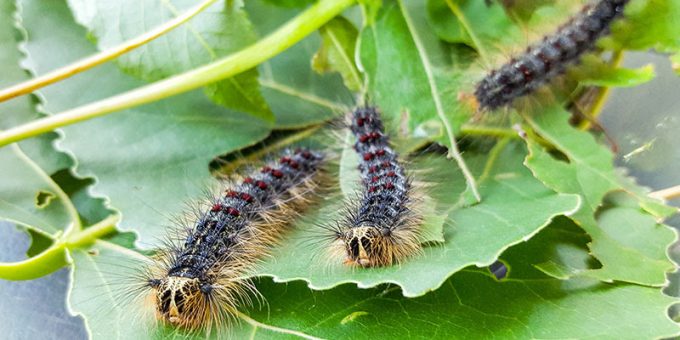
WEST LAFAYETTE – Purdue University and the U.S. Forest Service on Tuesday (July 12) announced the new and improved Alien Forest Pest Explorer interactive web tool.

The user-friendly dashboard combines information from multiple sources to show the impact of different forest insects and diseases, and the potential for further damage. The interactive and customizable dashboards are the first to overlay this pest data with related data about the status and health of the host tree species in the forest, according to Songlin Fei, the Dean’s Remote Sensing Chair and professor of forestry and natural resources at Purdue’s College of Agriculture, who led the project.
“We want to better understand the relationship between pests and tree hosts, as well as assess the vulnerability of our forests so that we can make the best decisions to preserve and protect them,” said Fei who leads Purdue’s Digital Forestry Initiative. “This was designed for everyone, not only for the professionals. Pest and disease prevention begins in your backyard. We want to put this tool in the hands of anyone who cares for trees so they understand what pests they may face, how to identify them, and how to protect their trees and forests.”

Fei collaborated with Nicole Kong, associate professor of geographic information systems at Purdue, to organize the data, and design and develop the tool, which Purdue hosts.
“With the COVID pandemic, we all became much more accustomed to using dashboards and realized the empowerment of being able to easily find information and trends specific to our area,” said Kong, who also is a part of Purdue’s Digital Forestry Initiative and Associate Dean of Research in Purdue University Libraries and School of Information Studies. “One can think of this as like a COVID dashboard for forest health and pest outbreaks. We worked to visualize the data in the most useful and intuitive way.”

The Alien Forest Pest Explorer, or AFPE, offers maps of pest species distributions; the growth, mortality and removal rates of host species; as well as trends in host abundance and information about the pests. The annually updated data has resolution to the county level.
The dashboard and its database of information are critical to forest health protection, said Tracy Tophooven, the acting station director of the U.S. Department of Agriculture Forest Service Northern Research Station.
“In the past few centuries, hundreds of invasive insects have been introduced to the United States through a variety of means,” Tophooven said. “This tool integrates the Northern Research Station’s critical invasive species research with forest inventory and analysis data to enable users to view county-level data to meet local challenges posed by invasive insects.”
The Alien Forest Pest Explorer database is maintained by Purdue, the U.S. Forest Service Northern Research Station, the U.S. Forest Service Forest Health Protection and the Forest Health Assessment and Applied Sciences team. The project also receives partial funding from the National Science Foundation.
Purdue’s College of Agriculture and the Forest Service have a history of successful collaboration, including a joint national level invasive plant project and a national level forest biomass and carbon project.



